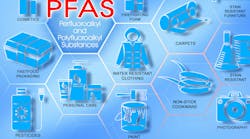By Dan Durda
Across the Nation, people are feeling the final end to one of the toughest winters on record. Concurrently, we witnessed perhaps the longest debate our Congress has ever conducted relating to health care replete with all the news media that described it to a process akin to sausage making.
The same unorthodox but essentially true description can be applied to how the American Recovery and Reinvestment Act (ARRA) was produced. The process was a messy, discombobulated, misunderstood attempt to stimulate jobs and projects with what initially seemed a welcome windfall of funding that brought $4 Billion for the Clean Water SRF and $2 Billion for the Drinking Water SRF. But as you could expect, Washington would have no part of something as straightforward as simply releasing those funds to ready-to-go projects often described as "shovel-ready," but instead attached the controversial "Buy American" provision with reporting rules intended for transparency that did nothing but create onerous obstacles.
The Buy American rule revolved around section 1605 of ARRA, which required recipients to use domestic iron, steel and manufactured goods that had been produced in the United States. There was also a great deal of language that addressed the re-shaping of materials that were or would be "transformed" on specific job sites that would be processed into another form or shape or would be combined into another raw material to create a material that has different properties than the properties of the individual raw materials. The thought process continued with such definitions as there was no requirement with regards to the origins of the component materials or subcomponent materials as long as the manufacturing or transformation of such materials occurred in the United States.
The only exceptions to these rules were if applying Buy American was inconsistent with the public interest or that the iron, steel and manufactured goods are not produced in sufficient quantities or of satisfactory quality or lastly, if those goods would increase the overall cost of the project by 25%. The "Substantial Transformation" analysis finally narrowed it down to the elimination of such attempts to describe this process as having merely undergone simple assembly, packaging or any other form of minimal change versus a more complex process.
That being said, the impact of this definition of what is "Made in America" became the near apocalypse of a trade war not seen since the "Smoot-Hawley" trade restrictions that triggered the Great Depression. These many restrictions raised havoc with manufacturers not only in sourcing materials from their already established global supply chains, but caused the bidding process on already designed projects to come to a standstill as providers of water and wastewater equipment were now in an awkward position of having all of their equipment bid assemblies, materials specifications and other components not of U.S. origin and hence, not in compliance with the ARRA 1605 requirements.
The Section 1605 provision left manufacturers scrambling to source local materials from new suppliers not at all geared up to handle sudden change requests and thus led to delays in re-submitting the specification material sheets that led to project delays for months before manufacturers could respond. This was contrary to the ARRA's intent of getting shovel ready projects jump started to assist the already ailing economy.
Given the dire outlook of an approaching global trade war, the providers of water and wastewater equipment were in crisis mode as one of the country's strongest trading partners, Canada, was now on the no trade list due to a 1990s exclusion of Canadian provinces and towns that were not part of the overall World Trade Organization's exemption as a trading partner to the U.S.
With the turbulent winds of uncertainty upon us, the time for major action was critical. The Water and Wastewater Equipment Manufacturers Association (WWEMA) stepped up to the plate and made a full court press to correct the deteriorating situation. Immediate action was required and enlisted through the Association.
WWEMA launched a massive campaign of interviews with the appropriate agencies as well as compile trade data on the market implications of such a move. WWEMA also was in constant communications with the major water industry associations, conducted interviews with the Canadian Broadcasting Corporation and maintained a constant barrage of articles published in key journals and newspapers.
WWEMA's direct involvement with the Office of the U.S. Trade Representative's Trade and Environment Policy Advisory Committee (TEPAC) provided guidance to stop the spread of protectionism as well. The end result was that an agreement was reached to end what was becoming an acrimonious dispute over the Buy American provision in the stimulus package.
Now we can say goodbye to a long, cold winter and look forward to those two Rosy Cheek Sisters, April and May as we celebrate the warm approaching season of friendly trade relations with Canada and all our trading partners.
About the author:Dan Durda serves on the Board of Directors and is Chairman-Elect of the Water and Wastewater Equipment Manufacturers Association (WWEMA). He is also a member of the Water Environment Federation. He is a co-founder and President/CEO of Aeration Industries International, Inc., a Chaska, MN based manufacturer of advanced aeration systems and wastewater treatment systems.
More WaterWorld Current Issue Articles
More WaterWorld Archives Issue Articles


